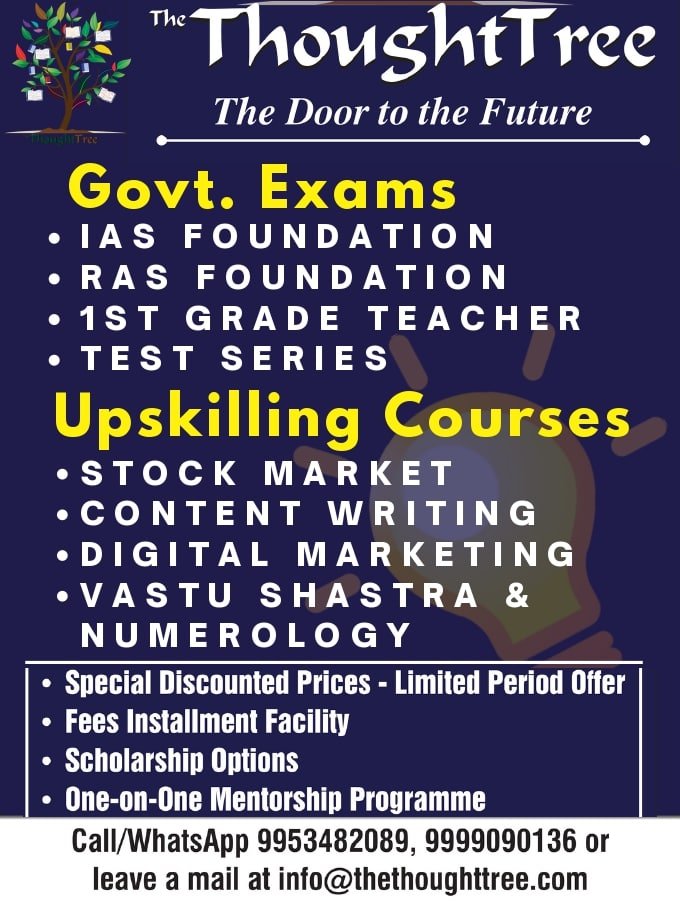The Union Public Service Commission (UPSC) exam is regarded as one of the world’s most challenging and prestigious exams; therefore, passing it requires a great deal of hard work and strategic study. Thousands of recent college grads sit for the UPSC exam each year, hoping to land a job in India’s highest government position. For those interested in joining the Indian civil service, there are close to 21 different job titles to choose from. But the reality is that not every one of them gets fortunate in pursuing their ideal profession. So, question arises for alternative career options for UPSC aspirants.

When you’ve been preparing for UPSC exams for some time but could not clear them, do not stress! There are various additional chances you might explore with your UPSC preparation skills. Today’s talk is more about the alternative employment alternatives for UPSC hopefuls.
But since the UPSC syllabus is a whole bundle of broad information spanning numerous subjects, it also covers several other government positions’ curricula. So, if you are studying for the UPSC exam, you are preparing for virtually all forms of government exams.
Alternative Career Options for UPSC Aspirants
Teaching & Tutoring
This is one of the most prevalent and popular alternative employment possibilities. Those who fail in passing the UPSC exam but who are interested in teaching and like explaining concepts to others may find success in the classroom.
I’m not just referring to working as a full-time professor at a university; while passing the TET exam is necessary for teaching in public schools, you can also set up a private tutoring business from the comfort of your own home, where you can help kids and adults alike prepare for government exams. Suppose you’re an engineer who also happens to be strong in math or another topic. In that case, you may create your own coaching facility and teach that subject.
You may start taking lessons in mathematics as an optional subject for UPSC applicants. At the same time, you can create your own YouTube channel and start educating the students about the topic in depth. You may also start mentoring your students about the mistakes you have made in your preparation and help them avoid such errors from occurring in their CSE examinations.
Teachers in India earn an average of 30,000 Indian Rupees a month. But this number varies widely depending on the school’s quality and the taught topic’s specialty. If you want to create your own coaching school, the cash you may charge will be proportional to the number of successful pupils under your tutelage.
Suppose you provide math lessons as one of the UPSC optionals, and the vast majority of your students pass the math optional exams as a result of your coaching. In that case, it stands to reason that you might charge more for your services as you expand.
Coding
Learning to code can help you land alternative career options for upsc aspirants with one of the world’s leading technology firms like Wipro, HCL, Infosys, Tech Mahindra, etc. This is especially relevant given that many aspiring civil servants have engineering degrees. Udemy, GeekForGeeks, GitHub, StackOverflow, CodeAcademy, CodingNinja, etc., are just a few of the places where you may learn to code and program.
Anyone can learn to code and find work in the IT industry; you don’t even need a degree in computer science. In the real world, your skills are far more important than the degree you earned and the grades you received.
Thus, many businesses now hire new graduates based on their skill set and experience instead of their academic credentials. While freelancing can increase your earnings, the typical compensation for a coder or programmer in India is estimated to be approximately 500,000 rupees per year.
SSC
Staff Selection Commission (SSC) tests can also be prepared for; the Combined Graduate Level Examination (often abbreviated as SSC) is an examination used to fill a wide variety of positions in government agencies across India. They are similar to other types of civil service examinations and are held once a year.
If you pass, you can work in the Indian Audit and Accounts department as an assistant audit officer or assistant account officer, as an assistant section officer for the CBI or the railways, and in the enforcement directorate of the Revenue Department as an inspector of income tax or as an assistant in the Ministry of External Affairs.
Higher Studies
GATE Exam
This is yet another viable job path you might pursue. You may also pursue further education and prepare for the GATE exam if it appeals to you. To get entry to graduate programs at IIT universities, prospective students must take the Graduate Admissions Test in Engineering (GATE).
Anyone currently enrolled in the third year of an undergraduate program (in engineering, architecture, BSc, BA, or BCom) can sit for this exam, as can anyone who has finished 10+2+2 or 10+3+1. If you’re an engineer and want to work with BDL, HAL, DRDO, etc., you can increase your chances of getting hired by taking the GATE.

Because the government owns the companies, PSU jobs are very similar to government positions in terms of benefits (such as promotions and retirement plans), with the exception that PSU employees have less say in day-to-day operations than those who aim for positions with the UPSC.
In addition, if you pass the GATE exam, the government will provide you with a monthly stipend to use toward your master’s degree or postgraduate work in your chosen field.
Read: 5 Tips to Crack UPSC Exam Easily
CAT
If you’re interested in attending an elite Indian business school like IIM or similar, you might also consider taking the Common Admissions Test (CAT). Master of Business Administration is the full version of MBA. Earning a master’s degree in business administration (MBA) is a great way to learn about many different aspects of running a firm.
Numerous opportunities await those with an MBA, including positions in sales and marketing, finance, project management, account management, and more. To be eligible for the exam, you must have earned a bachelor’s degree from an accredited university with a minimum of a 50 percent average in your undergraduate coursework.
Governmental Examinations And Other Exams At The State Level
While many hope to enter government service by passing the UPSC, this is not the only way to serve your country. Regardless of your level of responsibility, you will have the chance to help people in some way.
You can use what you’ve learned preparing for the UPSC exam to take any other government exams, such as those for the State Public Service Commission, the Securities and Exchange Commission, the banking industry, the government’s teacher certification program, and so on. All of them provide you with fresh opportunities to serve your country.
You have the option of taking state government exams in addition to pursuing higher education. Taking and passing the appropriate state government examinations is one way to enter the police force and work your way up to positions like constable or assistant commissioner.
Since these examinations are administered at a state level, competition is lower than in national civil service examinations. Since the UPSC board also administers these exams, the exam format and content should be familiar.
Bank PO
The Union Public Service Commission (UPSC) exam is renowned for its extreme difficulty. It essentially encompasses the entire syllabus of various other government exams, even including those for bank PO positions.
You might use your UPSC preparation skills to go after just government jobs if that is your goal. The comprehensive nature of the UPSC curriculum gives candidates a higher likelihood of success compared to other government exams. Its in-depth content contributes to a stronger chance of passing.
Hence, individuals who haven’t found success in alternative paths or are uninterested in government bureaucracy might find the banking sector to be a suitable option. It provides an alternative avenue for their career aspirations. Banks routinely advertise competitions for the positions of clerk and probationary officers. Competition for banking positions remains fierce; thus, tests emphasizing them and general knowledge and analytical reasoning are encouraged.
Find out the Books for UPSC Prelims.
Army
If you’re not interested in taking the civil service exam, joining the military is another option. UPSC administers the Combined Defence Services Examination to select future officers for the Indian Military Academy, Indian Naval Academy, and Indian Air Force Academy.
Studying for this exam will provide you with an opportunity to join the armed forces and serve your country. To join the Indian Army Academy, you should be 19 to 24 years old and single. To qualify for the Indian Navy, you need to be between 19 and 22 years old and single. For the Indian Air Force, the age range is 19 to 23 years, and being single is also a requirement.
If you want to take the Office Course for Men, you must be between 19 and 23 years old and single. If, at the age of 22, you don’t pass the UPSC civil service exam, you might want to think about the army and the CDS exam.
Digital Marketing
UPSC aspirants immerse themselves in books during preparation. Thus, it’s beneficial to explore non-bookish activities. This offers a chance to break away from being a bookworm and try something new. So one of the viable alternatives can be a certificate in digital marketing, which can be used to better prepare you for career options for UPSC aspirants in public service. The term “digital marketing” refers to the practice of promoting a company’s wares or services using digital channels. Many websites offer free or low-cost courses in digital marketing, including topics like SEO (search engine optimization), SEM (search engine marketing), PPC (pay per click), email marketing, affiliate marketing, and so on.
Jobs like digital marketing manager, social media manager, search engine optimization (SEO) expert, Facebook ad guru, and SEO writer are all within reach of those who acquire digital marketing skills. In India, a digital marketing manager can expect an annual income of about 7 million rupees.
So, apart from working individually for a firm, you can also create your own business or website and start writing material around a particular subject and make money, or you could start your own dropshipping business. You, too, can start a digital marketing company, etc. Learning digital marketing will open many doors to high-paying and in-demand careers.
You can similarly do social media marketing, paid advertising, content marketing, etc. depending upon your interest level.
Other Options
You might also establish your own business, either online or offline, or you could join forces with other like-minded idealists and volunteers to create an NGO that works for the greater good of society.
Additionally, you should consider career options for UPSC aspirants in politics because you already have a solid foundation in important subjects like political science, public administration, and the constitution; you are up-to-date on current events and understand the country’s social and economic issues.

Conclusion
These are the top professions for those hoping to work for the Union Public Service Commission (UPSC) one day. Leave your opinions on having a backup plan for UPSC and any other job options you’d like me to add to this list in the comments area. You now have a backup plan in case you don’t do well on the UPSC exam, but I’m sure that’s not your top concern.
You can speed up your studies for the UPSC by visiting our website. Our individualized instruction will make your test preparation a breeze and set the bar high for all of your future tests. All your questions and concerns will be answered, and your shortcomings addressed as we monitor your progress regularly.
If you’re unsure where to start, an expert from The Thought Tree can help you decide. You may help your friends prepare for the civil service exam by sharing this information with them.






[…] Read: Alternative Career Options for UPSC Aspirants […]